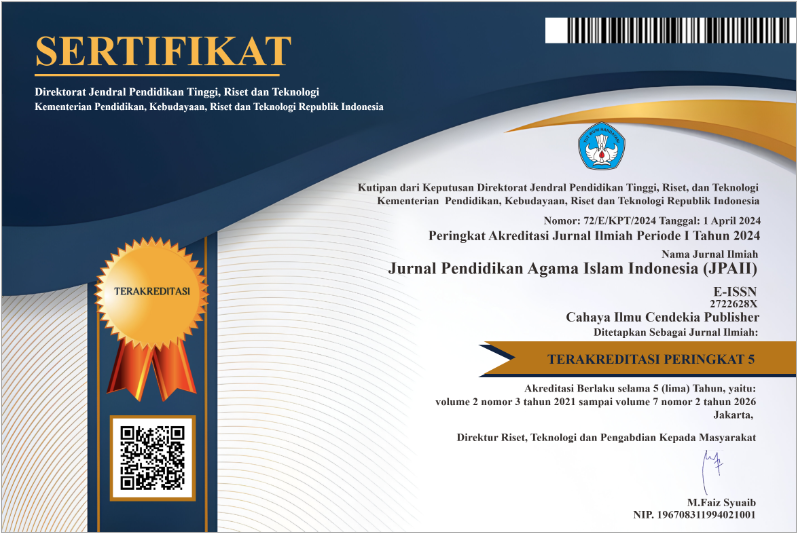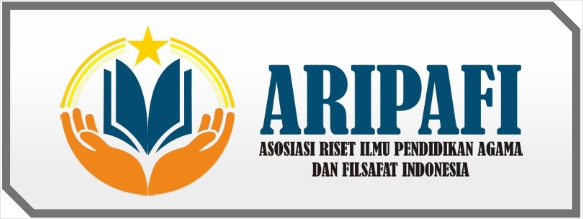Implementation of the Pedagogic Competence of Islamic Religious Education Teachers
Abstract
Purpose of the study: This research aims to bridge the gap in the literature by providing insight into the effectiveness of an integrative approach to improve the pedagogical competence of IRE teachers. In addition, this research will explore existing IRE teacher pedagogic practices in a contemporary context, which will provide valuable information for educational institutions and policy makers wishing to develop an effective IRE pedagogy. Therefore, the results of this study will provide significant benefits for IRE teachers and their students, educational institutions, and the wider community.
Methodology:This research uses the literature study method which relies on bibliographic sources from books and articles in scientific journals related to the subject matter, reading data with the thoughts of experts with a constructive approach and interpretation of the main content.
Main Findings: Recognizing the importance of the quality of human resources itself, the government and the private sector have and continue to work together to realize this mandate through various efforts to develop higher quality school education, including: (1) curriculum development and improvement, (2) evaluation system improvement , (3) improvement of educational facilities, (4) development and procurement of teaching materials, (5) training of teachers and other education personnel.
Novelty/Originality of this study: The learning process and student learning outcomes are not only determined by the school, pattern, structure and content of the curriculum, but are determined by the competence of the teachers who teach and guide them. Competent teachers will be better able to create an effective, enjoyable learning environment, and be better able to manage their classes, so that student learning is at an optimal level.
References
[2] M. Gök and M. İnan, “Sixth-grade students’ experiences of a digital game-based learning environment: A didactic analysis,” JRAMathEdu (Journal Res. Adv. Math. Educ., vol. 6, no. 2, pp. 142–157, 2021, doi: 10.23917/jramathedu.v6i2.13687.
[3] M. F. Muslim, “Implementasi Kompetensi Pedagogik Guru Mata Pelajaran Rumpun PAI Dalam Melaksanakan Pembelajaran (Studi Kasus Pada Guru MAN 1 Yogyakarta),” State Islam. Univ. Sunan Kalijaga Yogyakarta, 2019.
[4] G. M. Pherson-geyser, R. de Villiers, and P. Kavai, “The Use of Experiential Learning as a Teaching Strategy in Life Sciences,” Int. J. Instr., vol. 13, no. 3, pp. 877–894, 2020.
[5] A. Alfauzan, A. Alimni, K. D. Agus, T. Elza, and W. Adi, “Implications of Teacher Interpersonal Communication Ability on Student Learning Motivation in Islamic Religious Education Lessons During Pandemic,” J. Educ. Res. Eval., vol. 6, no. 1, pp. 156–167, 2022.
[6] A. Amin, D. A. Kurniawan, R. Perdana, W. A. Pratama, and E. Triani, “Analysis of the Relationship of Religious Character , Perseverance and Learning Motivation of Junior High School Students,” J. Innov. Educ. Cult. Res., vol. 3, no. 4, pp. 536–547, 2022, doi: 10.46843/jiecr.v3i4.233.
[7] I. Bararah, “Efektifitas perencanaan pembelajaran dalam pembelajaran pendidikan agama islam di sekolah,” J. MUDARRISUNA Media Kaji. Pendidik. Agama Islam, vol. 7, no. 1, pp. 131–147, 2017.
[8] N. Sappaile, “Pengaruh Kompetensi Pedagogik, Kompetensi Profesional, dan Sikap Profesi Guru Tehadap Kinerja Penilaian Guru di Sekolah Dasar,” J. Teknol. Pendidik., 2017.
[9] S. Julaiha, “Konsep Kepemimpinan Kepala Sekolah,” Tarb. Wa Ta’lim J. Penelit. Pendidik. dan Pembelajaran, vol. 6, no. 3, pp. 179–190, 2019, doi: 10.21093/twt.v6i3.1734.
[10] Ibrahim Sirait, “Pendidikan Karakter Dalam Pendidikan Islam,” PENDALAS J. Penelit. Tindakan Kelas dan Pengabdi. Masy., vol. 2, no. 2, pp. 82–88, 2022, doi: 10.47006/pendalas.v2i2.100.
[11] H. K. Rahmat, S. Pernanda, C. Casmini, A. Budiarto, S. Pratiwi, and M. K. Anwar, “Urgensi Altruisme Dan Hardiness Pada Relawan Penanggulangan Bencana Alam: Sebuah Studi Kepustakaan,” Acta Islam. Counsenesia Couns. Res. Appl., vol. 1, no. 1, pp. 45–58, 2021, [Online]. Available: http://alisyraq.pabki.org/index.php/aiccra/article/view/87/59.
[12] N. Soraya, “Analisis persepsi mahasiswa terhadap kompetensi dosen dalam mengajar pada program studi PAI fakultas ilmu tarbiyah dan keguruan UIN Raden Fatah Palembang,” Tadrib, vol. 4, no. 1, pp. 183–204, 2018.
[13] M. Hambali and M. Luthfi, “Manajemen kompetensi guru dalam meningkatkan daya saing,” J. Manag. Educ., vol. 2, no. 1, pp. 10–19, 2017.
[14] H. Jamin, “Upaya Meningkatkan Kompetensi Profesional Guru,” At-Ta’dib J. Ilm. Prodi Pendidik. Agama Islam, vol. 6, no. 2, pp. 148–160, 2022, doi: 10.24269/ed.v6i2.1489.
Copyright (c) 2023 Fauzi Ananda

This work is licensed under a Creative Commons Attribution-NonCommercial 4.0 International License.
Authors who publish with this journal agree to the following terms:
- Authors retain copyright and acknowledge that the Jurnal Pendidikan Agama Islam Indonesia (JPAII) is the first publisher licensed under a Creative Commons Attribution 4.0 International License.
- Authors are able to enter into separate, additional contractual arrangements for the non-exclusive distribution of the journal's published version of the work (e.g., post it to an institutional repository or publish it in a book), with an acknowledgment of its initial publication in this journal.
- Authors are permitted and encouraged to post their work online (e.g., in institutional repositories or on their website) prior to and during the submission process, as it can lead to productive exchanges and earlier and greater citation of published work.






.png)
.png)





















